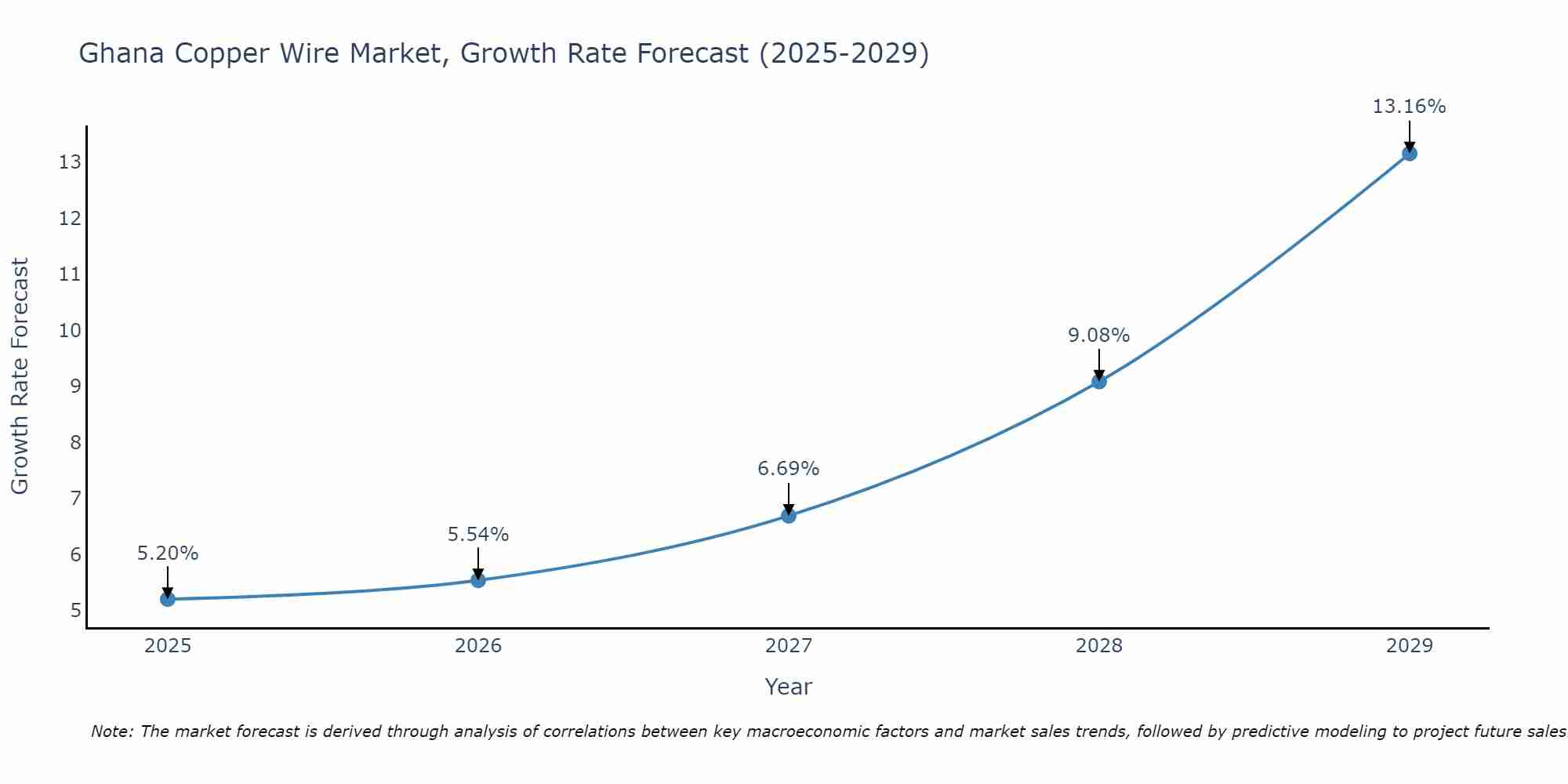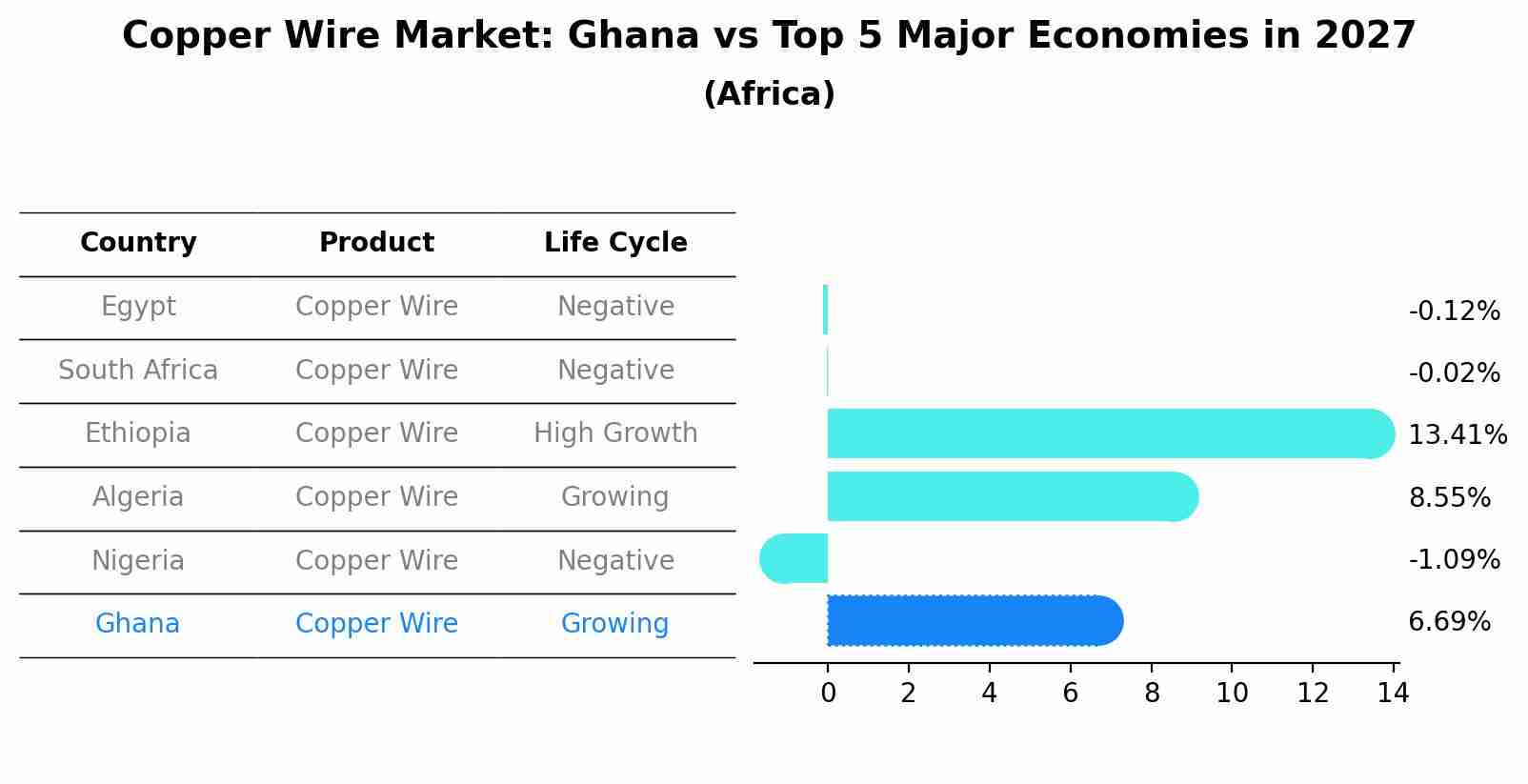Ghana Copper Wire Market (2025-2031) Outlook | Value, Share, Companies, Industry, Analysis, Trends, Growth, Forecast, Revenue & Size
| Product Code: ETC357956 | Publication Date: Aug 2022 | Updated Date: Aug 2025 | Product Type: Market Research Report | |
| Publisher: 6Wresearch | Author: Shubham Padhi | No. of Pages: 75 | No. of Figures: 35 | No. of Tables: 20 |
Ghana Copper Wire Market Size Growth Rate
The Ghana Copper Wire Market is poised for steady growth rate improvements from 2025 to 2029. From 5.20% in 2025, the growth rate steadily ascends to 13.16% in 2029.

Copper Wire Market: Ghana vs Top 5 Major Economies in 2027 (Africa)
The Copper Wire market in Ghana is projected to grow at a growing growth rate of 6.69% by 2027, highlighting the country's increasing focus on advanced technologies within the Africa region, where Egypt holds the dominant position, followed closely by South Africa, Ethiopia, Algeria and Nigeria, shaping overall regional demand.

Ghana Copper Wire Market Overview
Copper wire is a fundamental component in electrical and telecommunications systems, providing conductivity, reliability, and durability for power transmission and communication purposes. In Ghana, the copper wire market supports industries such as construction, infrastructure, telecommunications, and manufacturing. With urbanization, electrification, and technological advancements driving demand for electrical and electronic products, the Ghana market for copper wire is expanding. Wire manufacturers and distributors in Ghana offer a wide range of copper wire types and sizes to meet the requirements of diverse applications and projects across the country.
Drivers of the market
The expansion of electrical and electronics manufacturing, construction, and telecommunications industries in Ghana is driving the demand for copper wire. Copper wire is used for electrical wiring, cable manufacturing, and conductor applications, driving its essential role in infrastructure development and technological advancement in the country.
Challenges of the market
The copper wire market in Ghana encounters challenges such as copper price volatility and currency exchange fluctuations affecting raw material costs. Additionally, competition from alternative materials and counterfeit products may impact the market share of copper wire manufacturers and distributors.
Government Policy of the market
To support the copper wire market, the government may implement policies aimed at promoting sustainable mining practices, responsible resource management, and value addition initiatives within the mining sector. These policies could include regulations to ensure environmental protection, community engagement, and fair labor practices in copper mining operations, as well as incentives for investment in mineral processing and refining facilities to produce high-quality copper wire domestically. Additionally, the government may prioritize efforts to attract foreign investment and technology transfer to enhance the competitiveness of Ghana copper wire industry and maximize the value of its mineral resources.
Key Highlights of the Report:
- Ghana Copper Wire Market Outlook
- Market Size of Ghana Copper Wire Market, 2024
- Forecast of Ghana Copper Wire Market, 2031
- Historical Data and Forecast of Ghana Copper Wire Revenues & Volume for the Period 2021-2031
- Ghana Copper Wire Market Trend Evolution
- Ghana Copper Wire Market Drivers and Challenges
- Ghana Copper Wire Price Trends
- Ghana Copper Wire Porter's Five Forces
- Ghana Copper Wire Industry Life Cycle
- Historical Data and Forecast of Ghana Copper Wire Market Revenues & Volume By Application for the Period 2021-2031
- Historical Data and Forecast of Ghana Copper Wire Market Revenues & Volume By Building and Construction for the Period 2021-2031
- Historical Data and Forecast of Ghana Copper Wire Market Revenues & Volume By Telecommunication and Power for the Period 2021-2031
- Historical Data and Forecast of Ghana Copper Wire Market Revenues & Volume By Transport for the Period 2021-2031
- Historical Data and Forecast of Ghana Copper Wire Market Revenues & Volume By Industrial Equipment for the Period 2021-2031
- Historical Data and Forecast of Ghana Copper Wire Market Revenues & Volume By Electronics for the Period 2021-2031
- Historical Data and Forecast of Ghana Copper Wire Market Revenues & Volume By Others for the Period 2021-2031
- Ghana Copper Wire Import Export Trade Statistics
- Market Opportunity Assessment By Application
- Ghana Copper Wire Top Companies Market Share
- Ghana Copper Wire Competitive Benchmarking By Technical and Operational Parameters
- Ghana Copper Wire Company Profiles
- Ghana Copper Wire Key Strategic Recommendations
Frequently Asked Questions About the Market Study (FAQs):
- Single User License$ 1,995
- Department License$ 2,400
- Site License$ 3,120
- Global License$ 3,795
Search
Thought Leadership and Analyst Meet
Our Clients
Related Reports
- Afghanistan Rocking Chairs And Adirondack Chairs Market (2026-2032) | Size & Revenue, Competitive Landscape, Share, Segmentation, Industry, Value, Outlook, Analysis, Trends, Growth, Forecast, Companies
- Afghanistan Apparel Market (2026-2032) | Growth, Outlook, Industry, Segmentation, Forecast, Size, Companies, Trends, Value, Share, Analysis & Revenue
- Canada Oil and Gas Market (2026-2032) | Share, Segmentation, Value, Industry, Trends, Forecast, Analysis, Size & Revenue, Growth, Competitive Landscape, Outlook, Companies
- Germany Breakfast Food Market (2026-2032) | Industry, Share, Growth, Size, Companies, Value, Analysis, Revenue, Trends, Forecast & Outlook
- Australia Briquette Market (2025-2031) | Growth, Size, Revenue, Forecast, Analysis, Trends, Value, Share, Industry & Companies
- Vietnam System Integrator Market (2025-2031) | Size, Companies, Analysis, Industry, Value, Forecast, Growth, Trends, Revenue & Share
- ASEAN and Thailand Brain Health Supplements Market (2025-2031) | Strategy, Consumer Insights, Analysis, Investment Trends, Opportunities, Growth, Size, Share, Industry, Revenue, Segments, Value, Segmentation, Supply, Forecast, Restraints, Outlook, Competition, Drivers, Trends, Demand, Pricing Analysis, Competitive, Strategic Insights, Companies, Challenges
- ASEAN Bearings Market (2025-2031) | Strategy, Consumer Insights, Analysis, Investment Trends, Opportunities, Growth, Size, Share, Industry, Revenue, Segments, Value, Segmentation, Supply, Forecast, Restraints, Outlook, Competition, Drivers, Trends, Demand, Pricing Analysis, Competitive, Strategic Insights, Companies, Challenges
- Europe Flooring Market (2025-2031) | Outlook, Share, Industry, Trends, Forecast, Companies, Revenue, Size, Analysis, Growth & Value
- Saudi Arabia Manlift Market (2025-2031) | Outlook, Size, Growth, Trends, Companies, Industry, Revenue, Value, Share, Forecast & Analysis
Industry Events and Analyst Meet
Whitepaper
- Middle East & Africa Commercial Security Market Click here to view more.
- Middle East & Africa Fire Safety Systems & Equipment Market Click here to view more.
- GCC Drone Market Click here to view more.
- Middle East Lighting Fixture Market Click here to view more.
- GCC Physical & Perimeter Security Market Click here to view more.
6WResearch In News
- Doha a strategic location for EV manufacturing hub: IPA Qatar
- Demand for luxury TVs surging in the GCC, says Samsung
- Empowering Growth: The Thriving Journey of Bangladesh’s Cable Industry
- Demand for luxury TVs surging in the GCC, says Samsung
- Video call with a traditional healer? Once unthinkable, it’s now common in South Africa
- Intelligent Buildings To Smooth GCC’s Path To Net Zero


















